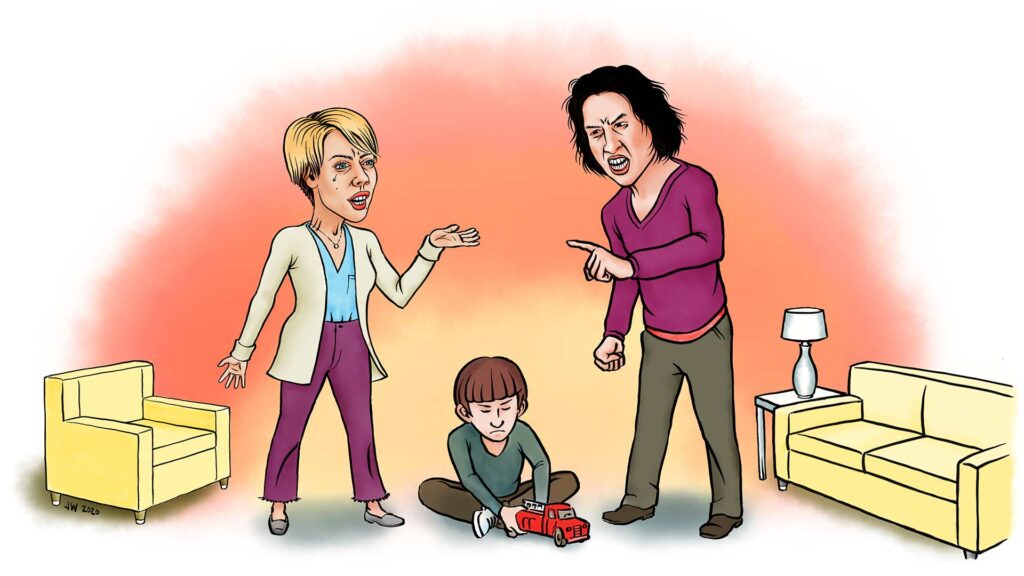
By Lauren Bokor, Esquire
Like many divorced Americans, I watched Marriage Story by Academy Award nominated filmmaker Noah Baumbach with clenched hands and an anxious heart. It’s a very realistic portrayal of how awful and wrenching the process of splitting up can be on a family, especially a family with children. Like Scarlett Johansson and Adam Driver’s characters in this movie, I too went through a litigated divorce. Given my personal experience, as well as my professional experience as a former divorce litigator and current mediator and collaborative lawyer for 30 years, I saw many heart wrenching events in Marriage Story that could have been avoided.
The first scene with the couple and their mediator set the path for many bad decisions going forward. While I agree with the premise of the mediator’s suggestion that each party start the divorce mediation by remembering how they used to feel about each other – so that they can end their marriage respecting the commitment they once made to each other – writing a whole page of their spouse’s attributes is too much for most divorcing couples to bare!
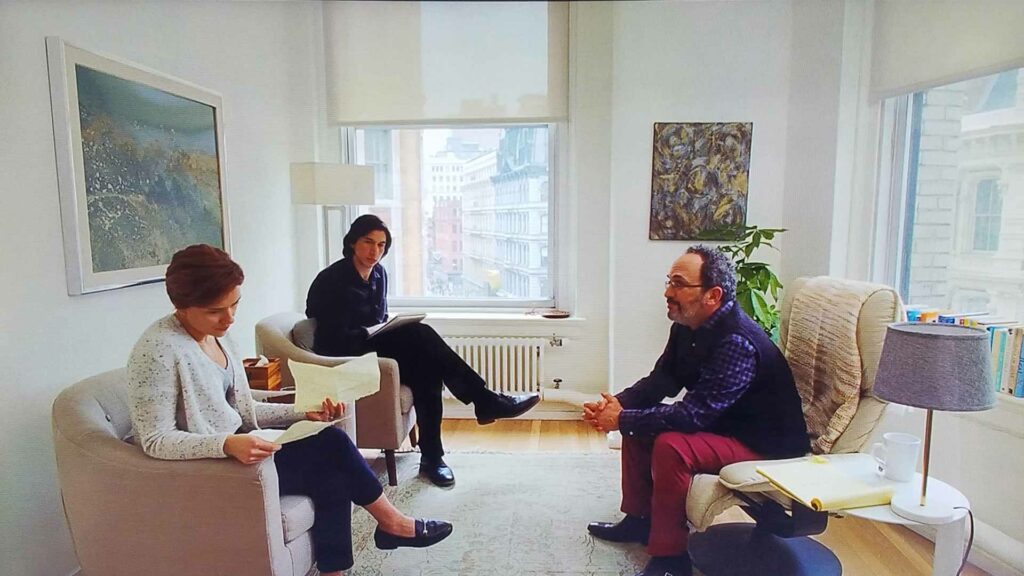
When choosing a mediator, look for a mediator who is sensitive to the emotional elements of a divorce, has a grounded structure for resolving marital issues and knows the law on point. Good mediators know how to strike a balance. Ask your prospective mediator about their credentials, process and philosophy before you hire him or her.
Many of the negative results of the parties’ decisions could have been avoided if they had chosen mediation or collaborative law to resolve their marital issues. In divorce mediation the couple meets with a neutral third-party and together they make decisions about their children and their assets. In collaborative law, each party retains a collaborative lawyer, and everyone agrees from the onset that if they cannot amicably resolve their issues the collaborative lawyers have to jump out of the case. This provides incentive for everyone to resolve the parties’ issues amicably. Both mediation and collaborative law provide the divorcing couple with a forum to participate in the decision-making regarding their children, their assets and debts, rather than having a judge making decisions for them.
When Scarlett Johansson’s character Nicole decided to take their son out of state, alarm bells rang out. One party’s desire to move out of state is usually a hotly contested issue. Although I first respected the couple’s attempt to resolve this hot issue without their mediator or lawyers, I anticipated the rapid deterioration of their divorce process with this turn in the story. When I first started doing divorce mediation, when clients would ask if they could discuss issues themselves, I would always say yes, because I did not want them to think I was trying to rack up legal fees. But I have since changed my tune after too many one-on-one client communications took a bad turn. Divorcing parties should not attempt to resolve hotly contested issues without a third-party (mediator or lawyers) present. In part because the mediator is trained on how to deal with conflict, but also, just having a third party in the room will keep the divorcing parties in line so that the communication does not break down and impede resolving issues amicably.
When Nicole’s mother got involved, another alarm went off. Unless the parents are harming the children, or can’t adequately represent themselves, grandparents should stay out of it! Judge Judy use to remind Grandparents that if they made enemies with a parent, they would likely alienate that parent and possibly compromise their ability to see their grandchildren. Grandparents in the middle of a divorce often add another layer of conflict that hurts more than it helps. Best to tell the grandparents to stay out of the divorce process.
In many scenes of Marriage Story, the parents talked about the divorce in front of their child, or discussed divorce issues with their child. It might seem obvious that this emotional crisis isn’t a burden for children to carry, but you’d be surprised how often I have to counsel my clients on this. Even when kids seem preoccupied by a game or television, they can still hear conversations. Watch them, they always seem to perk up when you’re discussing something dicey. Divorcing parents should not talk in front of or to their kids about the divorce issues, they should not take them to lawyer’s offices, and they should not use them as couriers of information or documents. They should be kept out of all divorce-related communications before, during and after the divorce. Keep the kids out of the Divorce Process!
As the movie portrays, Nicole’s decision to start the divorce process by filing papers in court has severe consequences. While there are at times just reasons for starting the divorce process by starting a divorce action (residence of the children is frequently one reason), most divorcing couples are best served to delay starting the divorce court action until they have been able to negotiate a settlement, preferably with mediators or collaborative lawyers. The reasons are quite serious. One reason is because once a divorce action is commenced the courts will impose deadlines on information requests, court conferences, etc. that take time and money to resolve. Also, having a court action hanging over the parties’ heads during negotiations will likely create undue pressure and expense.
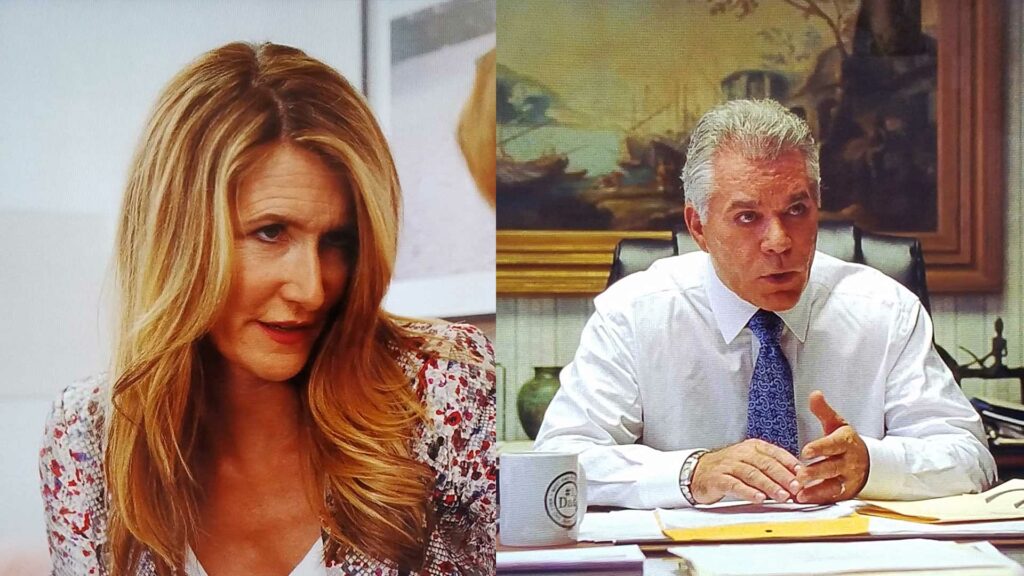
Ray Leota and Laura Dern provide a sobering and true depiction of divorce litigators. At first blush, it is easy to see their legal advice and actions negatively, but it is unfair to do so because they are doing what they’re supposed to do, representing their client by forming cogent legal arguments in their client’s defense. In divorce litigation, attorneys are required to represent their clients “zealously”. Granted, this can be done without a lawyer being deceptive, or nasty, or seductive (still reeling from Laura Dern’s character’s sexy removal of her jacket in court), but it is their job to use all legal arguments in support of their clients. The problem is not the lawyers, the problem is that the litigation system is not, in most cases, an appropriate forum for families to resolve their family issues. Also, zealous representation is often interpreted as a one-sided presentation of the facts. When one party receives the one-sided papers, or hears lop-sided testimony, he or she will be outraged and react with a similar one-sided response, and so on… This snowball effect makes resolving the parties’ issues amicably extremely difficult.
After a depressing scene of a botched Halloween with Charlie and his son, the movie beautifully portrays the evolution of each parent’s respect for the other parent’s time to be a parent. Initially Nicole denies Charlie access to his son because the child “had other plans”, and she unilaterally changes his Halloween plans. By the end of the movie, Nicole gives Charlie more access than their settlement provides. The Golden rule applies here in spades: divorcing couples should treat their ex as they would like to be treated. They should do their best to encourage the time their ex spends with their child. If not because it’s the right thing to do, but because of the real possibility that you would also need your ex’s support one day. Best to learn that sooner than later.
I found it sweet, and helpful, that Nicole explains the preference for her putting their child to sleep as his going through a “mommy stage”. When parents separate, they need to feel like the children love them and that they are good parents. Divorcing parents are usually more insecure about their parenting because they are not around their children as much as they were before the divorce, and because some may feel guilty for causing the child to have to separate from the other parent. Parents best serve their children when they help the child’s relationship with the other parent.
The scenes involving the interview with the child’s court-appointed evaluator, an assuredly odd woman, was a vivid illustration on the inappropriateness of a third-party (like a court-appointed evaluator or judge) making decisions about children in divorce. In litigation the court makes decisions about the child’s welfare. In mediation and collaborative law, the parents are part of the decision-making process regarding the child. In most circumstances, parents are better suited to make decisions for their own child.
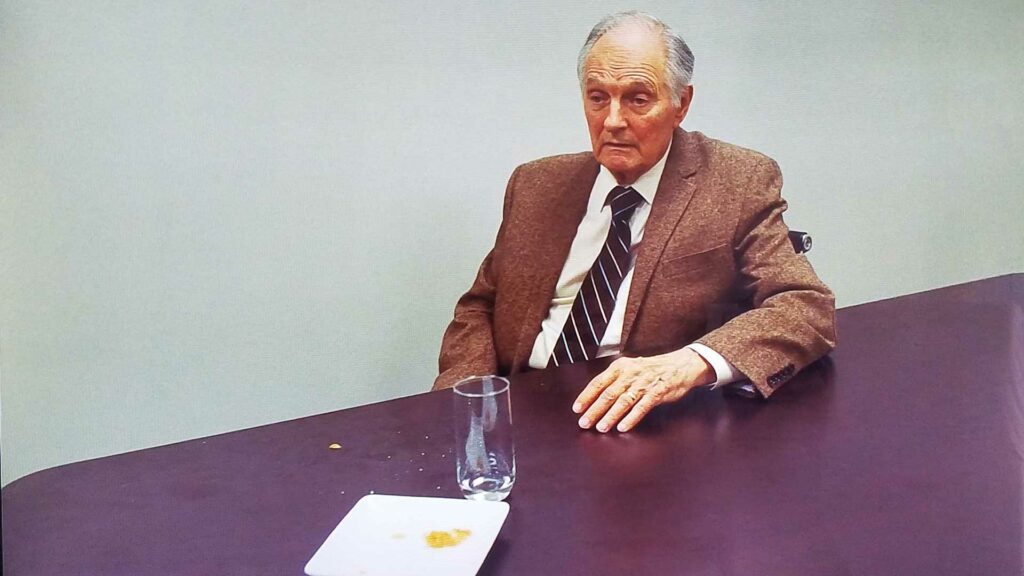
Charlie’s first lawyer, played by Alan Alda, seems to represent the “Burnt out Litigator” who has come to understand that our litigious system is doing much more harm than good. His monologue to Charlie on what’s wrong with the system ends with helpful advice on being a better husband in divorce and a better father in the future. The scene of Charlie coming over to try to fix the gate, and Nicole cutting Charlie’s hair and tying his shoes, shows the potential evolution of divorcing couples to realize they are both best served by helping each other in life. They will likely know each other for the rest of their lives if they have children, and friendly supportive relationships are in everyone’s best interest.
A number of times in the movie the parties or their attorneys reference “winning”. As a young divorce attorney, I was disheartened to realize that a large amount of divorce litigation attorneys don’t always do what’s in their client’s best interest, but instead follow their own – to perpetuate litigation. When I am mediating a divorce, especially where children are involved, I try to keep the parties out of litigation by talking constructively and shepherding them towards a successful end to their marriage. Trust is required for all parties to come to a mutual agreement on very important matters and avoiding litigation that damages the process is my best advice to divorcing couples.
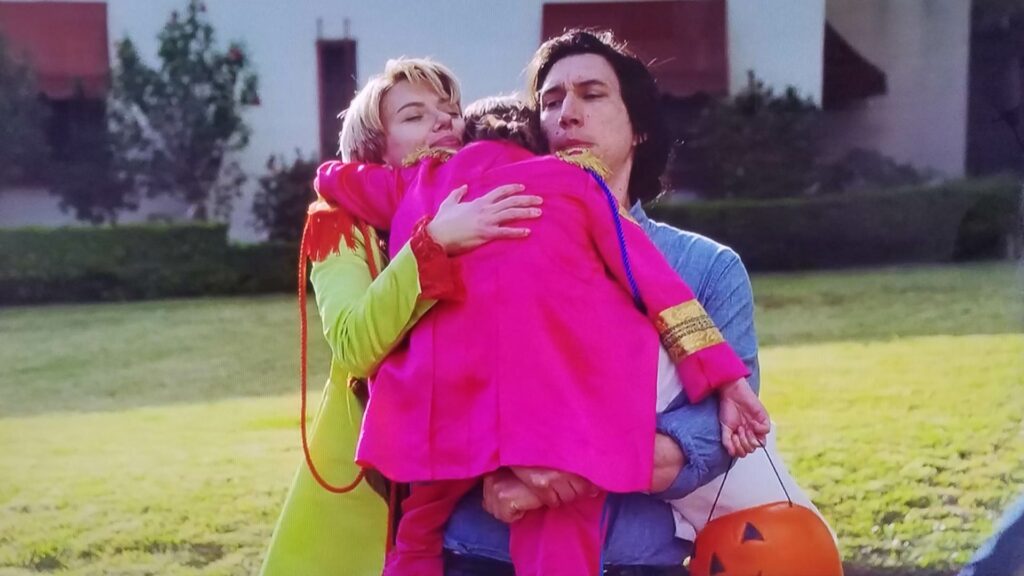
After many years in Family Law, I know not all divorces can be mediated, and that litigation might be necessary. However, I am hopeful that many divorcing couples will see this movie and appreciate the impact of the decisions they make on themselves, their spouses and their children. I am likewise hopeful that divorcing couples will read this article and see that, instead of litigation, there are alternative paths for divorce through mediation and collaborative law that better serve the emotional and financial needs of a family.
Lauren Bokor, Esquire is a divorce mediator and collaborative law attorney. She has practiced Family Law for over 30 years. Her book Divorcing Well: Getting Through Your Divorce with Less Stress and Lower Costs is available on Amazon.



